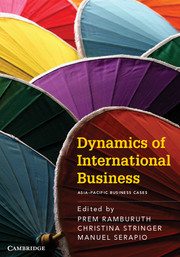Book contents
- Frontmatter
- Dedication
- Foreword
- Contents
- Contributors
- Preface
- Part I The Environment of International Business
- Part II Strategy and Entrepreneurship in International Business
- Part III Managing People in International Business
- 13 John Parker’s expatriate experiences in China
- 14 Dilemmas in working across cultures: Arun in a conundrum
- 15 Working in Chinese firms
- 16 Losing touch with the context: The story of Ravinaki Resort in Fiji
- 17 Foxconn: The complexity of quality control in a Chinese context
- 18 Quality through culture: Organisational development at New American Ice Cream
- Part IV Operating in International Markets
- References
17 - Foxconn: The complexity of quality control in a Chinese context
Published online by Cambridge University Press: 05 August 2013
- Frontmatter
- Dedication
- Foreword
- Contents
- Contributors
- Preface
- Part I The Environment of International Business
- Part II Strategy and Entrepreneurship in International Business
- Part III Managing People in International Business
- 13 John Parker’s expatriate experiences in China
- 14 Dilemmas in working across cultures: Arun in a conundrum
- 15 Working in Chinese firms
- 16 Losing touch with the context: The story of Ravinaki Resort in Fiji
- 17 Foxconn: The complexity of quality control in a Chinese context
- 18 Quality through culture: Organisational development at New American Ice Cream
- Part IV Operating in International Markets
- References
Summary
During the past decade, Apple (Inc.) has achieved spectacular success in the consumer electronics industry and was awarded the ‘World’s Most Admired Company’ from 2008 to 2012 (Fortune 2012). However, this triumph was somewhat over-shadowed by a series of worker suicides that occurred in one of Apple’s main contract manufacturers, Foxconn International Holdings Ltd, in China. This case study is based on our interviews with five managers and one production line leader in Hon Hai Precision Industry Co Ltd, the parent company of Foxconn, between October and December 2010.
Foxconn is a subsidiary of Hon Hai Precision Industry Co Ltd (hereafter Hon Hai), a Taiwanese company and one of the largest electronic manufacturers in the world. Hon Hai was ranked 132nd among the Global Fortune 500 Companies in 2009 and 109th in 2010. Hon Hai was founded in 1974, and Foxconn Technology Group was adopted as its trading name. In 1988, Foxconn established its first multinational manufacturing base in mainland China. The company opened a factory in Shenzhen, an industrial city in south China. By 2010, Foxconn had 13 factories in nine cities in China (Lau 2010); the largest (and oldest) is located in the Longhua Science & Technology Park in Shenzhen. This factory is also known as the ‘Foxconn City’, or ‘iPod City’, or more locally as the ‘Foxconn Campus’. There are more than 230 000 workers in this walled campus (Duhigg & Bradsher 2012), along with restaurants, shops, worker dormitories and a bank. Foxconn is particularly famous for assembling electronic goods such as Apple’s iPhones and iPods.
- Type
- Chapter
- Information
- Dynamics of International Business: Asia-Pacific Business Cases , pp. 170 - 176Publisher: Cambridge University PressPrint publication year: 2013
References
- 1
- Cited by



